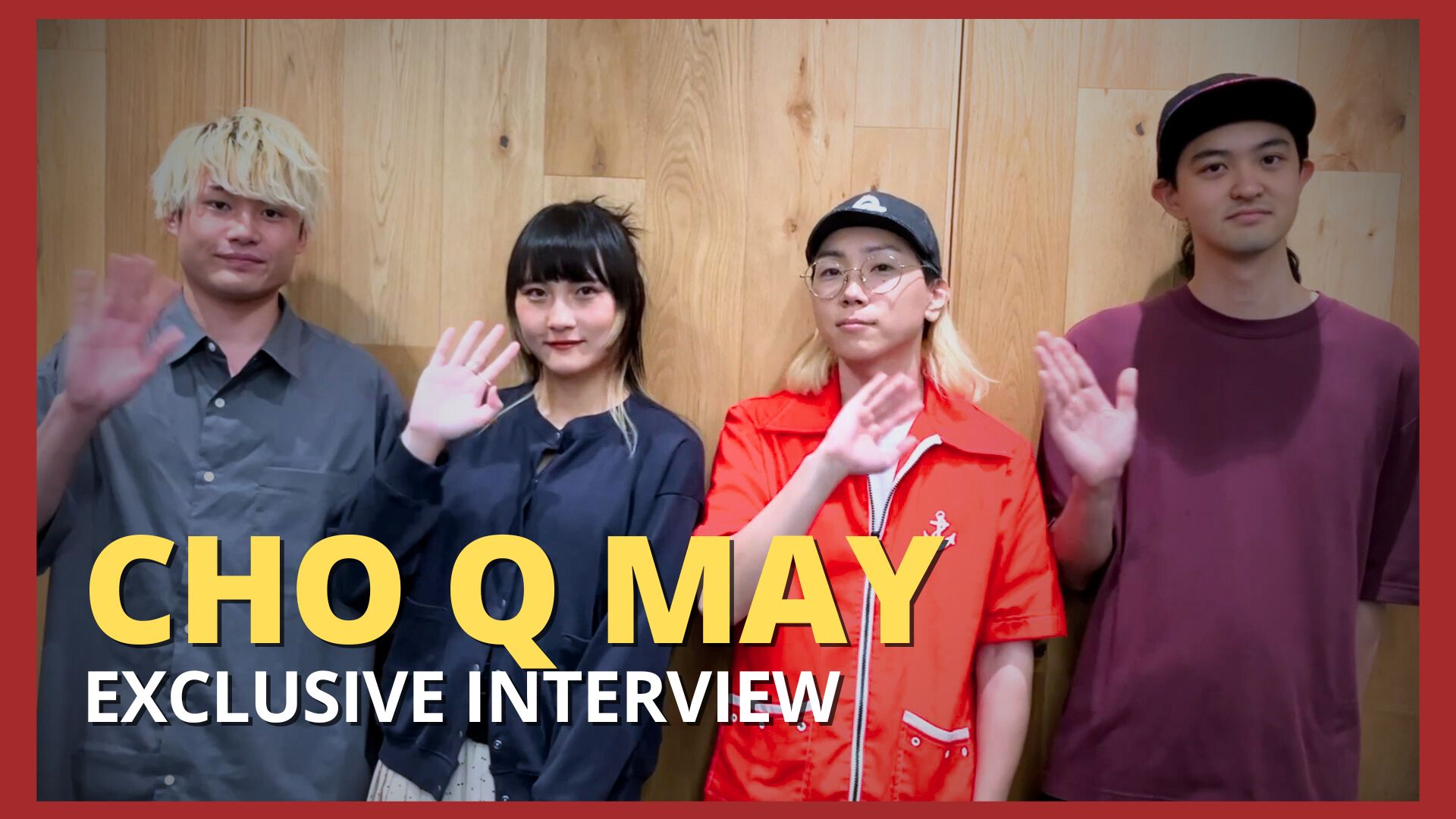On June 26th, 2024, ChoQMay unveiled their second full-length album, “ginghamcheck,” a collection that has already made waves across the Japanese music scene. Today, exactly two months after its release, we are excited to share an in-depth conversation with the band, where they reflect on the journey leading up to this album and the creative processes that have defined their work.
Formed in 2020 amidst the challenges of the COVID-19 pandemic, ChoQMay quickly established themselves as a band with a distinctive sound and vision. In our conversation, they opened up about how the pandemic influenced their early days and the formation of the band. Urara, the band’s vocalist and guitarist, recounts the origins of ChoQMay and how she gathered members from diverse backgrounds to bring their unique sound to life.
As we delved into the making of “ginghamcheck,” the band shared the thematic inspiration behind the album and how the concept of small elements coming together, much like the patterns in gingham fabric or the stars in a galaxy, influenced their approach to songwriting. They also discussed specific tracks from the album that hold special meaning for them, including “Sister” and “Mukashikatta Neko no Miichan,” and the memorable experiences tied to these songs.
In addition to discussing the album, ChoQMay reflected on their live performances, particularly their debut at major festivals like COUNTDOWN JAPAN 23/24, and the emotional moments during their “ginghamcheck” tour finale. They also shared insights into how social media has transformed their interaction with fans, allowing them to stay connected and motivated through direct feedback.
The interview concludes with a glimpse into the future, as ChoQMay hints at new projects and their aspirations to perform overseas. With their distinct blend of genres, thoughtful songwriting, and deep connection to their audience, ChoQMay continues to stand out as a band to watch in the ever-evolving landscape of Japanese music.
We hope this interview gives you a deeper appreciation for ChoQMay’s artistry and the dedication they bring to their craft. Whether you’re a long-time fan or new to their music, “ginghamcheck” offers a rich and layered listening experience that is sure to resonate with you.
Section 1: Band Formation and Early Days
Tell us about the formation of ChoQMay. How did the band members come together?
The band was formed in 2020, during the early days of the COVID-19 pandemic. Vocalist Urara, who had just entered a technical school, was unable to attend classes due to the pandemic. Driven by the desire to bring his music to life as quickly as possible, she reached out to various members. Urara gathered members from different backgrounds, including classmates, seniors from other schools, and contacts from live music venues.
What were the biggest challenges you faced as a new band starting out in 2020?
We were unable to perform live due to the pandemic. However, we used that time for production, and as a result, we were able to create a CD before our first live performance, which turned out to be a positive aspect.
How did the name “ChoQMay” come about, and what does it signify for the band?
When deciding on a band name, we wanted something auspicious. The name “ChoQMay” was inspired by the Japanese rakugo story “Jūgenmu,” particularly the phrase “長久命” (chōkyūmei), which means “long life.” We chose this name, written in katakana as “チョーキューメイ,” hoping that the band would have a long-lasting future.
Section 2: Musical Influences and Style
Who are some of your biggest musical influences, and how have they shaped your sound?
Urara is a fan of amazarashi, but since each member has a different background, we don’t have a single artist that we all consciously emulate.
Your music incorporates various genres. How do you decide on the musical direction for each song?
Each member arranges their part based on their background and the music they’re currently listening to, resulting in a variety of sounds. Sometimes, Urara brings a reference track, and we all draw inspiration from that.
Can you describe your songwriting process? How do you collaborate on creating new music?
Typically, Urara shares a song in its basic form, and each member works on their respective parts. We then enter the studio and refine the song through sessions. Some songs are inspired by free sessions among the members, while others are plotted using DAWs by keyboard Renpi or vocalist Urara. (note: DAW stands for Digital Audio Workstation. A DAW is a software platform used for recording, editing, producing, and mixing audio files. Musicians and producers use DAWs to create music digitally, allowing them to arrange different elements of a song, apply effects, and layer tracks in a highly controlled and precise manner.)
Section 3: Albums and Notable Works
Your debut album, “Surudoi Sasakure,” was well-received. How did its success impact the band’s trajectory?
“Surudoi Sasakure” was our first full album, and while there was some trial and error, we were able to showcase our dedication. About a year after its release, the song “Anata no Koibito ni Naritai” from the album gained popularity, significantly increasing our fan base. This recognition gave us the confidence to continue creating music.
The song “Sangatsu no Hanayome,” which became a hit as the opening theme for the drama “Ase to Sekken,” how did this collaboration come about?
Urara wrote the initial version of the song, and we all worked together on the arrangement. We read the original work of the drama, and creating a song based on a single theme broadened our perspective and approach to music.
What lessons did you learn from creating and promoting your earlier works that you applied to “ginghamcheck”?
Initially, we used to record songs immediately after they were completed. For “ginghamcheck,” we performed the songs live before recording and added a pre-production phase to refine the tracks. We also released singles and prepared music videos before the album release, applying our past experiences to enhance our promotional efforts.
Section 4: Latest Album – “ginghamcheck”
What inspired the themes and musical direction of “ginghamcheck”?
“Ginga” (galaxy) is made up of stars, and gingham check patterns are made up of threads. Both are formed by small elements coming together. Similarly, this album was created by combining songs with distinct personalities. Interestingly, the title “ginghamcheck” was decided before most of the tracks were written, so many songs were influenced by the title itself.
Can you highlight a few tracks from “ginghamcheck” that are particularly special to you and explain why?
- “Sister”: This track was created during a session with the whole band and was first performed at a major festival.
- “Yuuei Kinshi, Ten no Kawa”: The only acoustic track on the album, it marked our first attempt at field recording.
- “Mukashikatta Neko no Miichan”: We finished this track after performing at a major festival, making it a memorable piece for us.
How do you feel “ginghamcheck” differs from your previous works, both musically and lyrically?
Since the release of “Surudoi Sasakure,” our audience has grown, and we’ve become more aware of how our music is received. While maintaining our individuality and passion, we also considered our listeners more consciously during the creation of “ginghamcheck.”
Section 5: Live Performances and Fan Interaction
You’ve performed at various live events and festivals. What has been your most memorable performance so far?
Performing at large festivals like COUNTDOWN JAPAN 23/24 for the first time, and the final performance of the “ginghamcheck” tour (July 12, 2024), where Urara became emotional and performed in tears during the encore, are some of our most memorable moments.
How do you engage with your fans during live shows, and what do you enjoy most about performing live?
We hope our fans enjoy the live experience in their own way. We love seeing their happy faces while we perform, which in turn makes us enjoy the performance even more.
With the rise of social media, how has your interaction with fans evolved over the years?
Social media has allowed us to receive direct feedback after live shows, releases, and media appearances, which has greatly influenced our motivation as a band.
Section 6: Bonus Questions
What are some of your future plans or projects that fans can look forward to?
We plan to release more songs and hope to take on the challenge of performing live overseas.
What is the most unusual or funny thing that has happened to you on tour or during a performance?
During tours, we often travel to venues by car, chatting and having fun the whole way. Even at hotels, we enjoy having conversations over drinks, creating many fun memories together.
We would like to extend our heartfelt thanks to the members of ChoQMay for taking the time to share their insights and stories with us. A special thank you as well to their manager, the record label, and Junji Kondo for facilitating this interview and making it possible. Your cooperation and support are greatly appreciated. We look forward to seeing ChoQMay’s continued success and can’t wait to hear what they have in store for the future.

